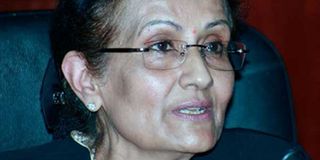Change coming as deputy CJ given retirement notice

Deputy Chief Justice Kalpana Rawal. FILE PHOTO | NATION MEDIA GROUP
What you need to know:
- JSC has decided to advertise her position to enable the Judiciary fill up the post immediately she retires.
- She said JSC resolved that the judges will not hear and participate in any further proceedings until the case that they filed is heard and determined.
Faced with a possible constitutional crisis over judges’ retirement age, the Judicial Service Commission (JSC) has stopped all judges aged 70 and above from hearing cases.
Deputy Chief Justice Kalpana Rawal, who retires next year when she turns 70, has been served with a retirement notice setting in motion a major succession battle.
JSC has decided to advertise her position to enable the Judiciary fill the post immediately Justice Rawal retires.
Yesterday, a statement signed by the Chief Registrar of the Judiciary Anne Amadi, indicated the institution was keen to resolve the issue that has become a big headache.
“The Judicial Service Commission also deliberated on the issue of judges who have since attained the retirement age of 70 years and upon being served with the retirement notice last year, they moved to court and obtained conservatory orders restraining the commission from removing or retiring them from office.
“It is, however, a matter of public concern that the said judges continue to sit and render decisions, a matter that has caused anxiety to the general public, litigants and JSC,” Ms Amadi said in the statement.
She said the commission had the mandate to promote and facilitate the independence and accountability of the Judiciary and the efficient, effective and transparent administration of justice.
Ms Amadi said the action had been taken as a matter of caution and in order to preserve the integrity of the judicial process.
“In order to forestall any likely constitutional crisis that may arise as a result of judges serving beyond their mandatory age, it was resolved that the respective judges will not hear and participate in any further proceedings until the case that they filed is heard and determined.
“We want to emphasise that in accordance with the conservatory orders granted by the court, the judges are not being removed or retired, however they will not continue sitting to discharge judicial functions or determine cases in court.”
The decision to stop the affected judges from discharging their duties awaiting a court decision has received mixed reactions.
“The Judicial Service Commission has done the right thing. However, this has come too late. The question as to whether the judges who have attained the age of 70 should retire is a non-issue and it is obvious that the Judicial Service Commission failed in its mandate because they appeared to have been playing safe,” said Mr Dennis Mosota, a city lawyer and member of the Law Society of Kenya Council.
He said that it did not require any technical interpretation to appreciate that according to the law, “a judge shall retire from office on attaining the age of 70 years”.
Mr Mosota is, however, apprehensive that by having earlier allowed judges who are supposed to have retired on attaining age 70 to continue presiding over cases, the Judiciary was courting a crisis that could prove complicated.
“I have no doubt in my mind that when the court renders its decision on this matter it will arrive at that decision and if it does then there is a high likelihood that some of the decisions rendered by these ‘retired’ judges either as individuals or as a bench will be subject of legal challenges,” said Mr Mosota.
But another lawyer who spoke on condition of anonymity because he is an interested party said the latest notice had exposed double standards in the JSC.
“There are court orders that have been issued regarding the matter of the retirement of two judges that has been going on for a while now.
“If there are orders why would the Chief Justice who chairs the JSC disobey them? By issuing this notice the commission is clearly disobeying the judge who granted those conservatory orders in the first place,” said the lawyer.
Justices Philip Tunoi and David Onyancha, who are challenging their retirement, argue that judges appointed under the old constitution should retain the retirement age of 74 as specified at the time they were employed.
In opposing the suit, the JSC maintains that all judges took fresh allegiance to the 2010 Constitution and should retire at teh age of 70.
“The significance of taking oath was an acknowledgment that they hold offices under the new Constitution and are bound by provision which requires all judges to retire at 70. Retirement of judges is an administrative issue and we don’t have to inform them in advance,” said Ms Amadi in her replying affidavit to the suit.
At the centre of the dispute are two conflicting circulars issued by the JSC in which it said all judges appointed under the old Constitution would retire at 74.
But the commission later issued another circular in which it resolved to retire all judges at 70 according to the new Constitution, and issued retirement notices to Justice Tunoi and Justice Onyancha.
The two judges argued that the decision was unconstitutional and illegal since the judges were subject to the transitional clauses of the new Constitution, which allows them to be in office until they are 74.




